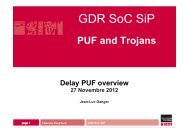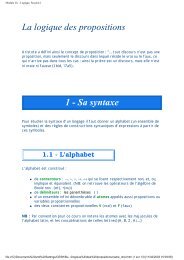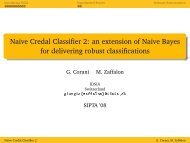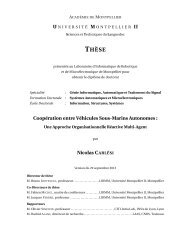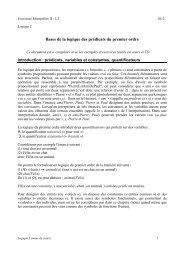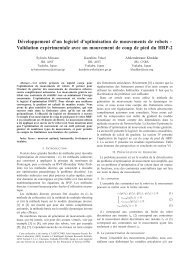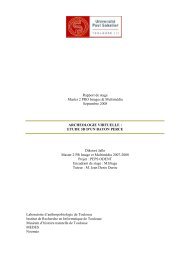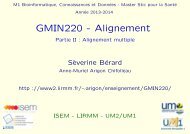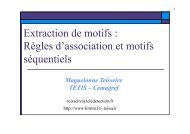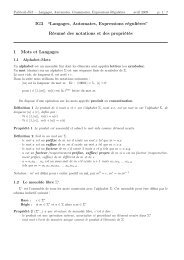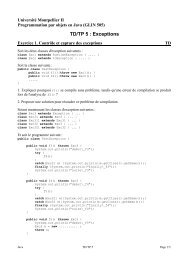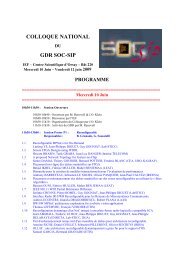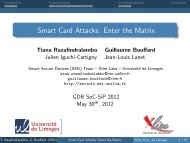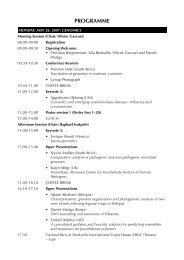Session WedAT1 Pegaso A Wednesday, October 10, 2012 ... - Lirmm
Session WedAT1 Pegaso A Wednesday, October 10, 2012 ... - Lirmm
Session WedAT1 Pegaso A Wednesday, October 10, 2012 ... - Lirmm
- TAGS
- pegaso
- october
- lirmm
- www2.lirmm.fr
Create successful ePaper yourself
Turn your PDF publications into a flip-book with our unique Google optimized e-Paper software.
<strong>Session</strong> <strong>WedAT1</strong>0 Lince <strong>Wednesday</strong>, <strong>October</strong> <strong>10</strong>, <strong>2012</strong>, 08:30–09:30<br />
Skill Learning – Dynamics<br />
Chair Rüdiger Dillmann, KIT Karlsruhe Inst. for Tech.<br />
Co-Chair<br />
08:30–08:45 <strong>WedAT1</strong>0.1<br />
Autonomous Online Learning of Velocity<br />
Kinematics on the iCub: a Comparative Study<br />
Alain Droniou, Serena Ivaldi, Vincent Padois and Olivier Sigaud<br />
Institut des Systèmes Intelligents et de Robotique - CNRS UMR 7222,<br />
Université Pierre et Marie Curie<br />
• Incremental and autonomous online<br />
learning of velocity kinematics, from<br />
scratch and in a limited time<br />
• Visual servoing task with general target<br />
and end-effector (unknown tool)<br />
• Three contexts: reaching the target in one<br />
or two different workspaces; tracking a<br />
target moving unpredictably by a human<br />
• Comparison of three ML algorithms:<br />
LWPR, XCSF and ISSGPR<br />
• Testing generalization capabilities, velocity<br />
in learning and robustness of parameters<br />
• ISSGPR performs better in all studied<br />
criteria<br />
The learning contexts<br />
09:00–09:15 <strong>WedAT1</strong>0.3<br />
Learning Concurrent Motor Skills in Versatile<br />
Solution Spaces<br />
Christian Daniel, Gerhard Neumann and Jan Peters<br />
FG Intelligent Autonomous Systems, TU Darmstadt, Germany<br />
Max Planck Institute for Intelligent Systems, Germany<br />
• Many interesting motor skill tasks<br />
have several distinct solutions.<br />
• Representing multiple solutions<br />
ensures operability of the robot<br />
even if the environment changes<br />
and can in addition lead to faster<br />
learning.<br />
• We present a hierarchical policy<br />
search method which can<br />
simultaneously learn multiple<br />
motor skills to solve complex<br />
tasks.<br />
08:45–09:00 <strong>WedAT1</strong>0.2<br />
Online Learning of Inverse Dynamics via<br />
Gaussian Process Regression<br />
Joseph Sun de la Cruz<br />
National Instruments, USA<br />
Bill Owen Dana Kulić<br />
University of Waterloo, Canada<br />
• On-line learning of the inverse dynamics of a robot manipulator with<br />
Gaussian Process Regression<br />
• Model is trained on a sparse subset of the observed data, with incremental<br />
updates to both the model and the hyper-parameters<br />
• Investigate the impact of full or partial prior information on the convergence<br />
• Comparison to existing approaches shows improved accuracy and reduced<br />
computational requirements<br />
Computation Time Required for a Single Prediction<br />
09:15–09:30 <strong>WedAT1</strong>0.4<br />
Learning Robot Dynamics with<br />
Kinematic Bézier Maps<br />
Stefan Ulbrich, Michael Bechtel,<br />
Tamim Asfour and Rüdiger Dillmann<br />
Humanoids and Intelligence Systems Lab<br />
Institute for Anthropomatics at the Karlsruhe Institute for Technology<br />
• Novel model-based machine<br />
learning algorithm<br />
• Tailored to efficiently learn the<br />
inverse dynamics<br />
• Based on the Kinematic Bézier<br />
Maps algorithm<br />
• Exact encoding of the equations of<br />
motion<br />
• Batch and incremental (online)<br />
learning<br />
<strong>2012</strong> IEEE/RSJ International Conference on Intelligent Robots and Systems<br />
–128–<br />
Plot of the Coriolis and centripetal<br />
forces on a robot joint



